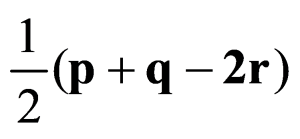Question
Question: Let **p**, **q**, **r** be three mutually perpendicular vectors of the same magnitude. If vector **x...
Let p, q, r be three mutually perpendicular vectors of the same magnitude. If vector x satisfies equation p×∣(x−q)×p∣+q×∣(x−r)×q∣+r×∣(x−p)×r∣=0 , then x is given by
A

B
21(p+q+r)
C
31(p+q+r)
D
31(2p+q−r)
Answer
21(p+q+r)
Explanation
Solution
Let ∣p∣=∣q∣=∣r∣=k
∴ p=kp^,q=kq^,r=kr^
Let 
Now, p×{x−q}×p} = 
=
=  = k2(x−q) – ∣p∣2(p^⋅x^)p^ = k2{x−q−αp^)
= k2(x−q) – ∣p∣2(p^⋅x^)p^ = k2{x−q−αp^)
∴ p×{(x−q)×p}+q×(x−r)×q}+r×{(x−p)×r}=0
̃ k2{x−q−αp+x−r−βq+x−p−γr}=0
̃ 3x−(p+q+r)−(αp+βq+γr)=0
̃ 3x−(p+q+r)−x=0
̃ 2x−(p+q+r)=0 ∴ 
